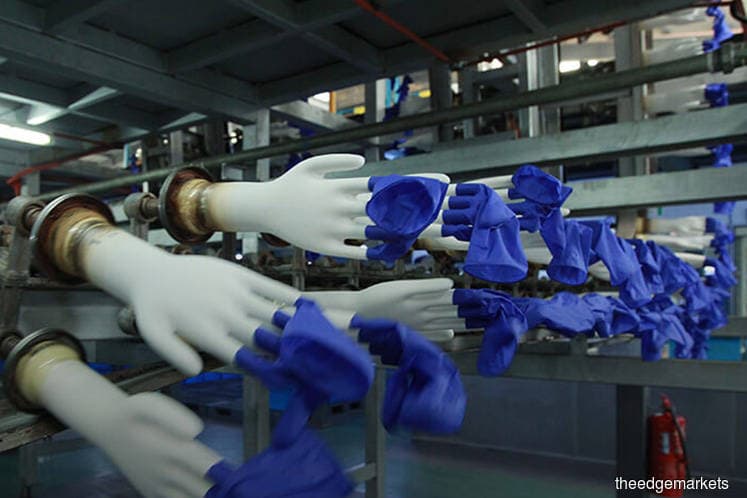
This article first appeared in The Edge Financial Daily on January 10, 2019
KUALA LUMPUR: The four leading glove manufacturers saw RM6.67 billion wiped out from their market value after their share prices fell over three days in a row this week on the strengthening of the ringgit.
The decline in the share prices is due to concerns that their earnings will be impacted as the companies’ revenue is denominated in US dollars.
Top Glove Corp Bhd, the most actively traded counter among blue chips, dropped 18 sen or 3.61% to RM4.80 yesterday, valuing the group at RM12.27 billion. The counter saw 24.7 million shares changing hands.
Hartalega Holdings Bhd closed 15 sen or 2.91% lower at RM5, giving a market capitalisation of RM16.65 billion. Volume totalled 15.01 million shares.
Kossan Rubber Industries Bhd fell 24 sen or 6.19% to RM3.64 yesterday, while shares of Supermax Corp Bhd closed unchanged at RM1.64. This brings both their market capitalisation to RM4.66 billion and RM2.15 billion respectively.
At the time of writing, the ringgit was trading at 4.1123 against the greenback. The local currency has depreciated to as low as 4.2020 over the past one year.
Bloomberg, citing a report by Citigroup, said shares in Malaysian glove exporters are under pressure from the ringgit’s strength, firmer crude oil prices and investors reducing exposure after two years of outperformance.
Citigroup noted that a 1% appreciation in the ringgit reduces glove makers’ earnings by 2% to 3%.
The research house also remains cautious on the sector for 2019 amid stretched valuations, higher supply from Chinese and Thai rivals, and capital expenditure at Malaysian companies, said Bloomberg.
Meanwhile, CLSA, in a report on Monday, has downgraded the Malaysian glove sector to “neutral”. It said that after a decent 2018, a lack of supply moderators in tandem with continued expansion threatens to destabilise the supply-demand dynamics.
CLSA’s Shane Chan said given the absence of demand/supply moderators, in tandem with continued capacity additions, supply will outpace demand by 8.2 billion in 2019.
“The ensuing heightened competition, in the nitrile segment specifically, threatens to diminish the cost pass-through mechanism, leading to earnings downside risk,” said Chan.
He highlighted that the expectations of blunted earnings render valuations too pricey at this juncture, hence the firm’s decision to lower its stance on the sector to “neutral” from “overweight” in 2018.
Chan also downgraded Top Glove and Kossan to “sell” and Hartalega to “underperform”.
The profitability of glove makers is also exacerbated by the waning US dollar as the currency plays a big part in glove makers’ profitability as 100% of their revenues are denominated in US dollars while only a fraction of cost is US dollar-denominated, noted Chan, adding that a stronger greenback also increases the purchasing power of glove makers’ customers.
“Our sensitivity analysis indicates every 1% change in the US$:RM results in a 2.7% to 4.2% change in earnings across the glove companies under our coverage,” said Chan.
“Coupled with expected increases in a myriad of costs, we think there is prevalent downside risk to profitability,” said Chan, adding that in isolation, the oversupply environment is manageable via continued efficiency improvements, but expected escalating operational costs could tip the scale.